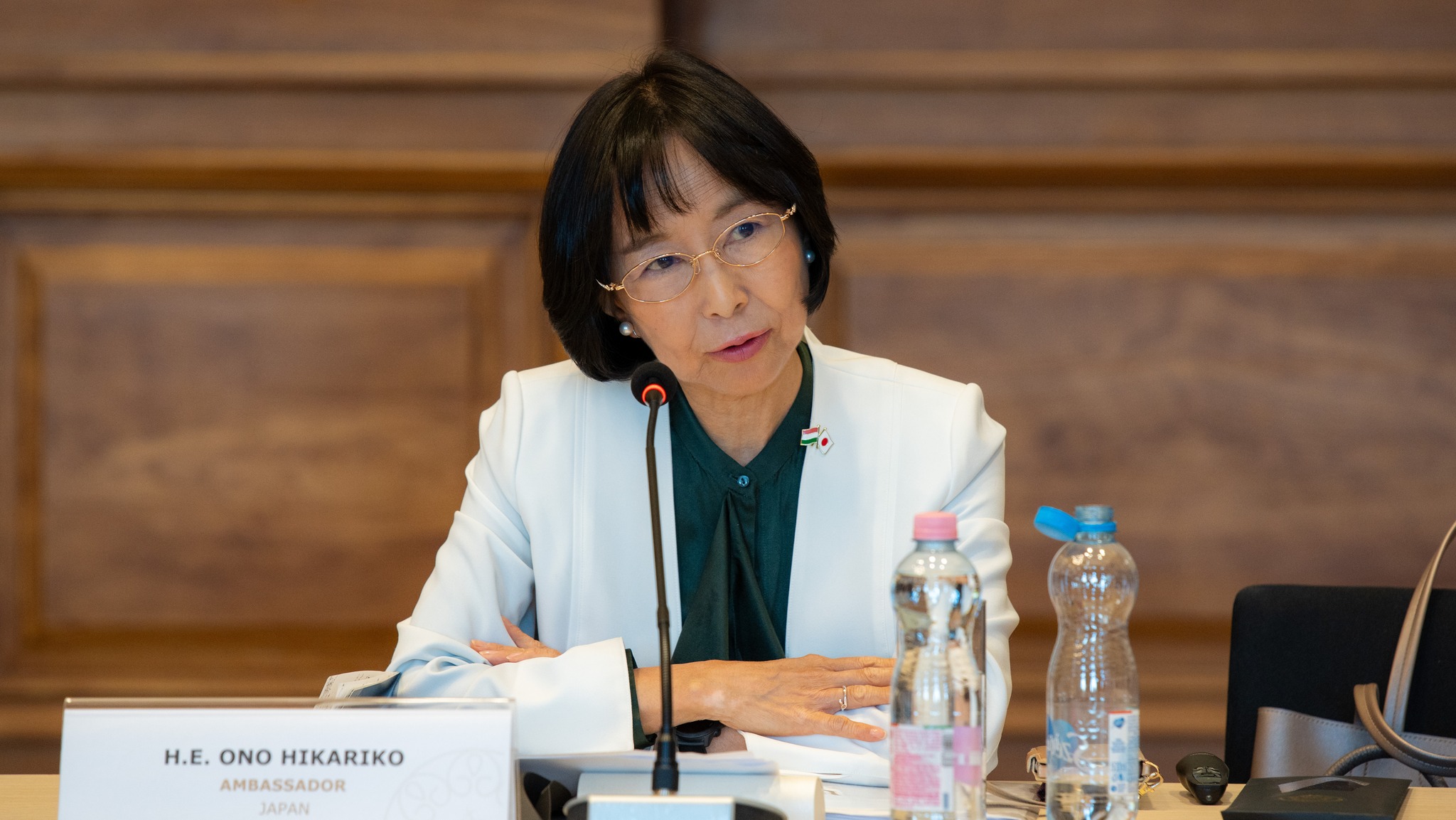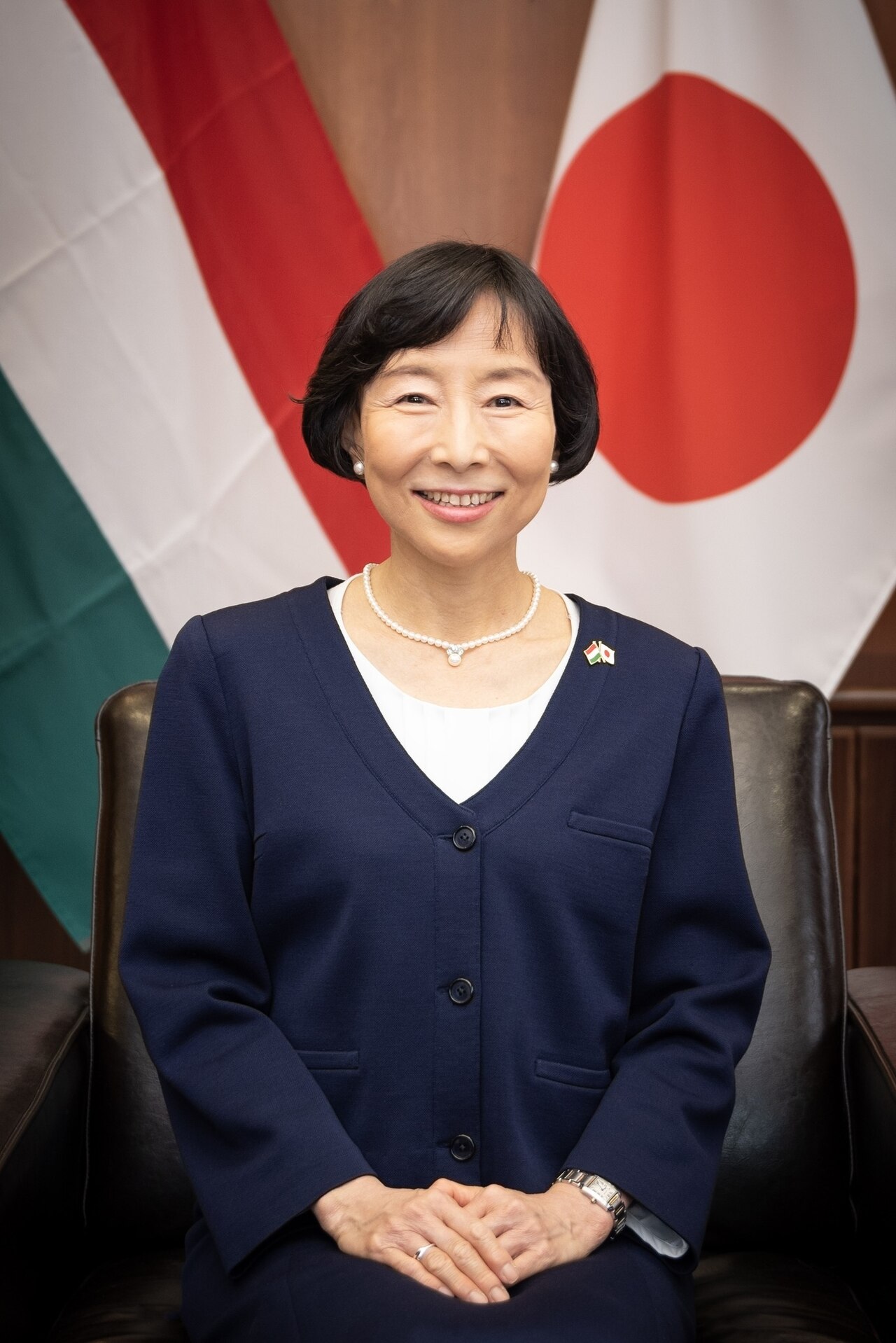Change language:
INTERVIEW with Japan’s Ambassador to Budapest on Japanese investment in Hungary, the Ukraine war, culture and more

We at Daily News Hungary had the pleasure of conducting an interview with Her Excellency Ambassador Ono Hikariko, Ambassador of Japan to Hungary. Read the intriguing conversation below!
Daily News Hungary (DNH): You arrived in Budapest a few months ago, how do you feel being here and what are your first impressions of Hungarians?
Her Excellency (H. E.) Ambassador Ono Hikariko: I am honoured to serve as the Japanese Ambassador to Hungary, which has a long-standing friendship with Japan and is full of charms. I am also fascinated by living in the beautiful city of Budapest, a UNESCO World Heritage Site.

While in Budapest, I find it wonderful that music and art are deeply integrated into everyday life. The Hungarian people are full of warm hospitality. I also appreciate that people, including travellers, can get a safe and memorable experience in Hungary with reasonable precautions
DNH: Although the distance is great, Hungarians feel very close to the Japanese and have a great respect for them. What do you think about this?
H. E.: Japan and Hungary have maintained friendly bilateral relations for more than 150 years. It is worth noting that the Japanese government supported Hungary’s post-regime change reforms, and Japanese companies were among the first to enter the Hungarian market. We are proud of our track record in that Japan has always been a strong supporter of Hungary’s economic development in both the public and private sectors.
This year marks the 100th anniversary of the start of Japanese language education in Eötvös Loránd University (ELTE). Thanks to such a long-standing friendly relation and the efforts of our predecessors, the Hungarian people have developed a deep interest in Japan and its culture, and are eager to further their understanding.
DNH: Japanese investment is a major contributor to Hungary’s economy. What trends do you see? Will more Japanese companies come to Hungary in the near future?
H. E.: I am pleased to note that Suzuki cars, a company that had been in investment negotiations even before the regime change and commenced manufacturing shortly thereafter, are now affectionately referred to as “our car” in Hungary. Currently there are about 180 Japanese companies active in Hungary, predominantly in the manufacturing sector and particularly within the automotive industry. Given the concentration of EV production in Hungary, there are numerous Japanese manufacturers of EV-related components.
As Hungary boasts a substantial number of talented and highly skilled individuals, I believe that Hungary will continue to be an attractive destination for Japanese investment in research and development, start-ups, and other high value-added innovative sectors.
Additionally, the popularity of Japanese cuisine has been rising recently, with an increasing number of restaurants serving Japanese food in Hungary. I welcome this development as another means to strengthen the relations between our two countries.
DNH: What kind of Hungarian companies can establish themselves in Japan? Which Hungarian products do the Japanese buy?

H. E.: Japan aims to become “the best country in the world in which to do business” by actively promoting foreign direct investment through various incentives, including financial support and expedited procedures.
Particular attention is being given to the fields of semiconductors, digital transformation (DX), green transformation (GX), and bio-healthcare. There is a significant potential for collaboration with Hungarian companies that possess outstanding technologies and expertise in areas such as IT and green technologies. In particular, start-ups offer promising opportunities for bilateral investment.
Hungarian products popular in Japan primarily include food items such as wine and foie gras, and crafts like Herend and Zsolnay tableware. Recently, Hungarian honey has also gained popularity. Given the Japanese affinity for charming (Kawaii) stuff, I personally believe that Miska jugs may become popular in Japan.
DNH: What is your opinion on the relationship between the governments of the two countries? What meetings have been held recently and what meetings are expected in the near future?
H. E.: On May 21, 2024, Minister of Foreign Affairs and Trade Péter Szijjártó visited Japan and held meetings with the Japanese Foreign Minister, the Minister of Economy, Trade and Industry, and the Minister of Land, Infrastructure, Transport and Tourism.
During the Foreign Ministers’ Meeting, the Ministers exchanged views on bilateral relations, the situation in Ukraine, and regional affairs including in East Asia, and agreed to continue the close bilateral discussions. During the meetings with the Minister of Economy, Trade and Industry and the Minister of Land, Infrastructure, Transport and Tourism, respectively, a Memorandum of Cooperation on cooperation and exchange of information in the field of nuclear energy, and a Memorandum of Cooperation in the field of water management were also signed. The Japanese government intends to continue exchanges with Hungary at various levels.
I am also confident to expect that the opening of the new Consulate in Osaka scheduled for this year and the Expo 2025 Osaka, Kansai, Japan will greatly contribute to further strengthening our bilateral relations.
DNH: There is a war going on in the neighboring country and the world is completely divided on this matter. The Hungarian Government believes that Ukraine should not be given weapons, that it should not be helped, and that peace is needed at all costs. The Western countries, on the other hand, are helping Ukraine against the invading Russians precisely so that they can defend themselves. Where does Japan stand on this issue?
H. E.: As we emphasized at the “Summit on Peace in Ukraine” in Switzerland, Japan’s position is that “just and lasting peace” should be realized on the basis of the principles of international law, including the UN Charter, and that any attempt to unilaterally change the status quo through force or coercion must not be justified.
We respect that the Hungarian government has so far taken in Ukrainian refugees, provided medical assistance to displaced people, offered free train tickets and subsidized companies that employ them. Japan has been cooperating with Hungary in providing humanitarian aid to Ukraine.
Japan’s position that it will strongly promote support for Ukraine and sanctions against Russia remains unchanged, and we intend to continue our discussions with Hungary, which is a NATO and EU member state. At the same time, we aim to respond to the situation in Ukraine in cooperation with like-minded countries in the world.
DNH: How stable is the situation in your region, with North Korea, Russia and China as counter-poles?
H. E.: The security of Europe, the Atlantic and the Indo-Pacific region are inextricably linked, and Prime Minister Kishida has consistently asserted that “Ukraine today may be East Asia tomorrow”. We welcome the fact that many countries, including the European countries, share this view and are showing increased interest and engagement in the Indo-Pacific region.
Recent developments in military cooperation between Russia and the DPRK will not only lead to a further deterioration of the situation in Ukraine, but are also seriously concerning in terms of their impact on the security of the region surrounding Japan. Any attempt to unilaterally change the status quo in the East and South China Seas by force is unacceptable.
In response to this challenging security environment, Japan has been working to achieve a budget level of 2% of GDP of the combined budget for fundamental reinforcement of defense capabilities and complementary initiatives, and has also been strengthening cooperation with like-minded countries. As part of these efforts, most recently, officers from the Japanese Ministry of Defense and the Self-Defence Forces visited Hungary to observe NATO’s Vigorous Warrior 2024 Multinational medical exercises.
DNH: Leaving politics aside, let’s talk about Japanese culture. Suffice it to mention haiku, Japanese gardens or even kimono in dress. Which aspects of your culture have been most adopted by Hungarians, and why do you think you have so many followers in Hungary?
H. E.: Cultural exchange is a vital aspect of the Japan-Hungary relationship. In recent years, a diverse range of Japanese culture has gained popularity in Hungary, such as Manga, Anime, Japanese cuisine, and Sake. At the ‘Japan Day’ event held at the Museum of Ethnography in June this year, a variety of programs were organized, including traditional Japanese musical performance (using Japanese traditional music instruments such as Shamisen and Koto), martial arts, kimono dressing, tea ceremonies, traditional handicrafts, Japanese swords, cosplay, and J-POP. I was impressed by the large number of Hungarian visitors, who showed great enthusiasm for Japanese culture.
I believe that the emotional bond between Japan and Hungary transcends geographical distance. The shared cultural heritage and the spirit of mutual understanding and respect may be what attracts the two nations to each other. We sincerely hope that the people-to-people exchanges between our countries will continue to deepen through cultural exchanges.
Both the Embassy and myself will continue to share information about Japan and Japan-Hungary exchanges on our social media platforms. We cordially invite Daily News Hungary readers to follow us there.
DNH: Japanese gastronomy doesn’t need to be introduced to anyone, but how familiar are people in Japan with Hungarian food?
H. E.: Prior to my arrival, I had the opportunities to taste authentic Hungarian meals prepared by Hungarian chefs at a restaurant in Tokyo. I found that Hungarian cuisine appeals well to Japanese tastes.
Hungary’s diverse food culture, including the Tokaj wine and Gulyas soup, is well known in Japan. Foie gras dishes are particularly popular, and much of the foie gras consumed in Japan comes from Hungary.
I would like to promote Hungary’s diverse food tradition and café culture on the Embassy’s Facebook page and other media platforms.
DNH: When it comes to Hungarian food, which soup-main dish-dessert trio do you like the most?
H. E.: I’m a big fan of Gulyás and other Hungarian soups. As to main course, I prefer either Töltött Káposzta or Paprikás Csirke. Desserts are hard to choose from since there are so many delicious options, but I particularly like Palacsinta, Beigli, and Kürtőskalács, specially from the street vendors.
DNH: Our last question: Budapest is by far the most popular tourist destination in Hungary. You have probably visited several other regions, which three rural attractions would you recommend to your friends if they were to come here?
H. E.: I’ve only been here for about four months, so I’m on a journey to explore the charms of various regions in Hungary. Of the places I’ve visited so far, I’ve been particularly impressed by the beauty of Tihany around Lake Balaton and I also have fond memories of visiting wineries and tasting wine in Tokaj.
My family will be visiting Hungary this summer, and we plan to explore some other destinations together. I’ll share my third favorite place with you at another time in the future.
Read also:
- Interview with Palestinian Ambassador Dr Elhusseini on Israel, Hungarian-Palestinian relations and many others
- Ambassador of Norway to Hungary on cooperations, Hungarian gastronomy in Oslo, Norwegian students and community and more – Interview
- Interview with Kosovan Ambassador Budima on the Kosovan-Hungarian relationships and many more







